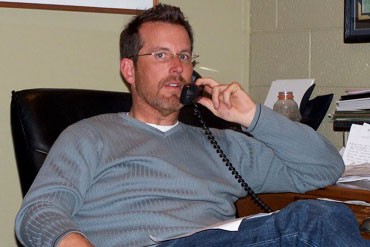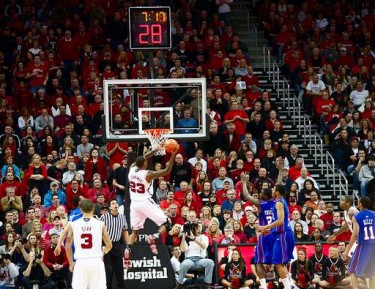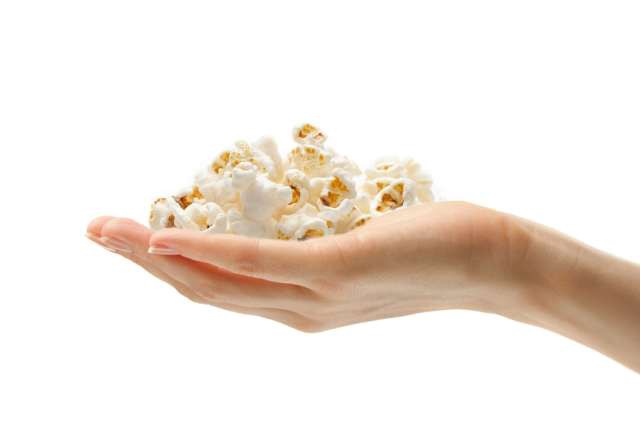JFK Airport a Foul Nest of Luggage Thieves, Claims Random Dude
JFK Airport a Foul Nest of Luggage Thieves, Claims Random Dude

CBS New York News — that’s the TV station that didn’t employ Sue Simmons — is going big on how JFK airport is a hotbed of thefts in checked luggage. Their claim: there are 200 thefts a day, every day, from checked bags: “Baggage handlers, jetway workers and even security people are all in on the ongoing scam to steal you blind,” is what they’re screaming. Their big money quote is from “JFK security lawyer Kenneth Mollins.” Did you know there was a kind of lawyer who was a “JFK security lawyer”? That seems unusual! Actually, Kenneth Mollins is a “personal injury attorney.” He once:
• represented a client who sued American Airlines because there were maybe peanuts on board and her son might have had an allergic reaction.
• represented a woman who was upset because a steam pipe explosion in Manhattan reminded her of 9/11. (Not joking.)
• represented two fellows who had “neck and back pain” after a Black Monday Walmart trampling episode in Long Island.
• represented himself when he leased a car and couldn’t get the Bluetooth phone system to work properly.
So if you have a claim that seems outrageous and likely unwinnable, we have a lawyer for you! And also when “law enforcement sources” tell CBS New York that 200 thefts a day are occurring at JFK, you might want to consider their sourcing.
Newt Gingrich's Chunk
“A Political Memo article last Tuesday about the Republican race for the presidency quoted incorrectly from comments by a senior aide to Newt Gingrich regarding the release of his financial report from February. The senior aide said the campaign was expecting to show a ‘nice chunk of debt’ from the month. He did not say it was expecting to show a ‘huge chunk of debt.’”
"Pac-Man Fever," Thirty Years Later
I’ll bet there were some people 30 years ago who took this as a sign that we were coming to the end times. (Maybe they were right?) On March 27, 1982 heartland rockers Jerry Buckner and Gary Garcia hit the Billboard top ten with their paean to the world’s most popular video game. CBS Records realized they were on to something, and gave them a budget and one month to record an entire full-length album of similarly-themed tunes. If you are exactly 41-years-old, you might remember such titles as “Froggy’s Lament” or “Doin’ the Donkey Kong.” I like it in the beginning of the clip above, from American Bandstand, when Dick Clark says, “I don’t where these two fellows came up with the idea. Or why…”
How They Got There: A Conversation With Wilderness Therapist Brad Reedy
How They Got There: A Conversation With Wilderness Therapist Brad Reedy
by Noah Davis

Brad Reedy grew up surfing in Orange County. He originally planned to be an English teacher, but a chance internship pushed him toward the practice of wilderness therapy instead. With a few colleagues, Reedy launched Second Nature, a treatment group dedicated to helping troubled preteens, teens and young adults. Four years ago, he stepped back from the therapy side to focus on outreach and growing the organization, which now has four sites in three states. As the face of the company, Reedy travels 130,000 miles a year. We met on one of his recent trips to New York.
How did you get here?
During my graduate work at Brigham Young University, I got an internship with a wilderness therapy group. I didn’t really know what I was getting myself into, but my professor referred me to them. I just showed up one day. I didn’t really know what wilderness therapy was, and I wasn’t extraordinarily comfortable with camping, but it didn’t take long for me to realize it was one of the most potent and effective ways of doing therapy I’d ever seen. I started working with adolescent boys and girls, treating mood disorders, oppositional disorders, drug addiction. The movement that I saw them experience in a period of six or seven weeks was more profound than I saw in any of the out-patient treatment centers that I’d worked at or even any of the residential treatment centers that I had worked at. I just fell in love with it.
What is it about wilderness therapy that works?
I think about what makes it effective a lot. I think it definitely is unplugging. And I think that is more profound today than it was 15 years ago. A lot of what I attribute the success to is what we call primitive living. We provide them supplies. We provide them food and all the gear that they need, but they have to do everything themselves every day. They have to build their own shelter. They have to cook their own food. They make fire every day to cook on and stay warm by. They do it in small groups of eight to 10 students. Every lesson you want to impart to them is implicit in daily living.
Did you ever see yourself as a businessman?
No. I got a Ph.D in family therapy, and I thought I might have a private practice but I’m not trained in business. It just kind of happened. A few of us were working at another wilderness therapy program that now doesn’t exist, and we wanted to do it better. Our contribution to the industry is that we made it more clinical. We brought really powerful traditional, clinical therapies to wilderness therapy. Wilderness therapy was great and we loved where we worked, but we thought everything that was holding it together was therapist driven. We started it ourselves, and we made every decision based on what was clinically best for the kid. That was always the reference point.
What I brought to it business-wise was customer services. I don’t know where I learned it — maybe when I worked at the Gap in college? — but there’s no excuse for anything less than perfect customer service. That means that our therapists and our office staff do perfect customer service for everyone that was a referral source, a parent, or anyone else. That’s what has made us successful.
Customer service is one of the last things you would think of as being important for a parent struggling with an addicted child. But on some level, it makes a lot of sense.
That’s what it’s all about. I’m in New York today to do a parent support group. Nobody in our industry does this; we do it for free. I fly out here; parents don’t pay for it. It’s just a service. I’ve always said that if you have a good plumber who does great customer service, he’s a great plumber. But if you have a great plumber who does poor customer service, he’s a poor plumber. When parents send their kids to us, it’s the love of their life. They are giving their kid over to the unknown, so in the first day when they get three, four, or five phone calls from us letting them know how their kid is doing, it’s important.
Why did you step away from the therapy side?
About four years ago, we decided that we need someone in an outreach position. I speak at universities. I talk to parent groups. I talk to psychiatrists and therapists all over the country. I pulled out of being a primary therapist a few years ago. I still get to work with the parents probably more than most therapists, but I don’t get to work with the kids at much. I am going back into the field in a month for five months. I’m excited about that because I get to work with the kids on the ground and with the staff, but I’ve lost some of that.
I’m sure you hear a lot of tough stories from the people you treat. Is that side of it ever overwhelming?
No. There are parts of the job that are hard, but it’s almost never about the clients. It’s about the paperwork, the politics of a referral source, or the marketing. It’s all that other nonsense. It’s dealing with an employee or co-worker who can be difficult. I had about 1,000 clients on my own personal caseload, and I had some difficult ones. But the more difficult they were, the more stimulating my job was, the more inspiring my job was. There were times of burnout where it was hard to do the work, but that was about me. I had to change. It didn’t matter what I was doing. So I would just work through it, invest more, and the burnout would just kind of fade away.
You sound like a total jock. You grew up in Orange County, where you surfed and did other outdoor sports. It’s not surprising you ended up here.
Yeah. I also was one of the kids that we deal with, so that predisposed me to this. I was going to be an English teacher, and then I took a child development course. I realized that was the way I thought, so I changed majors over to family science. The problems that I had as a child and the times I was sent to the counselor’s office as a kid was what really set me up to do this job.
You’re on the board of the National Association of Therapeutic Schools and Programs Board. What do you do with them?
We’re really a trade organization that does lobbying and government relations in Washington D.C. I’ve been out there half a dozen times to meet with Senators and Congressmen and women to work on issues that are relevant to the laws they are developing regarding childcare and treatment. That was why we started our organization. We provide training for continuing education units. I sit on the board to help plan and develop the national and regional conferences. That would be one of the parts of the job that can at times be laborious, but I decided to get involved to give back. This industry has given me and us a lot. We could have let someone else do it, but my partners and I decided to accept the request they made to have me on the board.
You’re the public face of Second Nature. I assume that was intentional?
When we were decided to have someone in this role, we decided it was me because it’s also what I like to do. I like to talk publicly. I like to teach.
Where do you go from here?
I just finished the first draft of a book in the last month.
Congratulations.
Thank you. That actually feels good, because it has taken a long time. I’m going to be working on getting it published.
Is it a memoir?
The working title is Questions in Raising Difficult Kids. I get lots of questions about raising difficult kids, and I say the same things over and over and over again. I wrote a book where each chapter starts off with a question a parent would ask me, then I write about the answers.
If I knew what next, I’d be doing it because there’s nothing that’s stopping me from evolving our model or stopping us from adding something to it. We’re always thinking about what’s next.
Who should I talk to next?
Sandy Hale. She’s a teacher at a private school in Manhattan.
Noah Davis is frequently lost.
Mars Needs Bathing Suits
“If it moves like water, it may very well be water.”
— Oregon State planetary science professor Joe Levy discusses the “recurring slope linneae” visible on the surface of Mars in recent high-resolution photographs. Some people think the lines, which run downhill into ravines, offer proof that water exists in frozen form on the red planet’s crust, and melts into flowing liquid during warmer months. Of course, with James Cameron fresh back from his trip seven miles deep into the Mariana Trench, other possibilities come to mind.
"Top Five Wild Bird Web Cams"
San Diego Zoo Condor Cam over Osprey Cam? You’ve got to be kidding me!
The Story Of Junk
Remember Significant Objects? It’s the project from Rob Walker (Buying In) and Joshua Glenn (Taking Things Seriously) wherein writers are paired with a cheap garage sale/thrift shop item chosen by the curators. The writers compose a short story about the item, and the item is put up for auction on eBay. Well, here’s your chance to signify! Rob and Kurt Andersen visited a thrift store in Manhattan and picked up “three prime examples of junk.” Can you come up with a backstory for them? Of course you can! And you should.
Grading The Final Four

After two weeks of exhilarating games, we’re down to four teams — and what a four it is. All four are among college basketball’s most elite programs, with 49 Final Four appearances and 13 NCAA titles between them. While the Kentucky Wildcats will enter the final weekend as the favorite, all four schools have a legitimate chance to bring home the 2012 national title. Let’s look ahead and examine why each of these four squads might — or might not — win it all.
OHIO STATE
Why they’ll win: Last season’s edition of the Buckeyes entered the NCAA tournament as the overall No. 1 seed and looked primed to earn the school’s second national title. But a plucky Kentucky team sent them home early. This year, the same team, minus its best outside shooter, has made it two games further, into the Final Four. So what gives? Chemistry.
Ohio State has the right makeup for a long run in the tournament: a confident and highly competent point guard in Aaron Craft, secondary scorers capable of creating their own offense in Deshaun Thomas and William Buford, talent in the key role positions and a superstar in the paint in All-American Jared Sullinger. They’re also a year older and little wiser after the disappointment of last year. The Buckeyes coach, Thad Matta, has been here before, losing in the title game in 2007. Kansas will present a tough matchup of similar style: a bruising and talented big man and a willingness to grind it out. Thomas could be the difference for OSU. The sophomore shoots very well for his size and presents match-up problems for most teams.
Why they won’t: Sullinger is a wide body that plays mostly below the rim. He likes to bang but doesn’t block shots. That kind of play occasionally leads to foul trouble, and in three of the Buckeyes’ losses this year Sullinger had four fouls. Another factor when Ohio State struggles is outside shooting, something OSU lost when Jon Diebler graduated.
Craft is not a credible scoring threat from behind the arc and Buford can go cold, as he did in several of Ohio State’s losses.
Even if Sullinger and Thomas deliver in the Final Four, it will be important for the Buckeyes to get scoring from a third source — either Buford or Craft or perhaps one of their role players. While decent defensively, the Buckeyes aren’t a team that can shut you down for the full 40 minutes. In an up-and-down game, Ohio State may find itself unable to produce enough points.
KANSAS
Why they’ll win: This season’s Kansas team has far exceeded most observers’ predictions, and that’s mostly due to Player of the Year candidate Thomas Robinson, who has been dominant from the opening of the season. When the Jayhawks are on, their passion, energy and will are evident, and those stem directly from their star player. On the defensive end, center Jeff Withey has become one of the nation’s best, and he allows the Kansas perimeter defenders to gamble because he can erase opponents’ drives.
Thomas rarely, if ever, has a bad night. And like former KU forward Danny Manning, now an assistant at his alma mater, Robinson has the stuff to carry a team. If enigmatic guard Tyshawn Taylor and defensive ace Elijah Johnson are hitting jumpers, the Jayhawks become a very hard team to beat because of their defensive intensity.
Why they won’t: Occasionally, the “bad” Taylor shows up. He makes some boneheaded decisions and can take bad shots. When this happens, the team struggles mightily to score, as it did against N.C. State in the Sweet 16, a game Kansas barely won. It becomes glaringly obvious when Taylor is off that KU has no other complement scorer to Robinson. Ohio State’s defense will be much tougher to manufacture points against than North Carolina, so getting Taylor involved will be key. Kansas doesn’t have trouble defending. If the Jayhawks lose, it will likely be because they just don’t have enough people who can put the ball in the basket consistently.
LOUISVILLE
Why they’ll win: Mayhem. Pure and simple. While this Louisville team doesn’t have the star power you’d expect from a Rick Pitino-coached club, the players are solid. There are a few potential pros on the roster in point guard Peyton Siva and frontcourt players Gorgui Dieng and Chane Behanan. But none of the Cardinals are capable of putting the team on his back for two more games. That said, star power is not why Louisville won the West Region and the Big East tournament.
The Cardinals frustrate you with pesky defense and opportunistic scoring, especially on steals and deflections that lead to run-out baskets. Pitino’s team wants to make the game as frenetic as possible, offering you open shots you shouldn’t take and charging the passing lanes when you hesitate. When Louisville becomes toughest is when the game is ugliest. Pitino’s coaching acumen — which gets questioned mostly because of his erratic recruiting in recent seasons — could be the difference in the high stakes of the Final Four.
Why they won’t: The Cardinals’ margin for error is minuscule. When Siva is off, the team is, too. He’s lightning quick, but that occasionally leads him to play out of control. He’s not a good outside shooter, so teams try to bait him into taking threes in lieu of driving to the basket, his strong suit. Without Siva, the Cardinals look lost on both ends. Russ and Chris Smith, no relation, are the only players who seem to create their own offense for Louisville. Leading scorer Kyle Kuric has good range but disappears for long stretches.
When the Cardinals have struggled this season, it’s usually been about offense, not defense, which is a bit ironic since the popular perception of Pitino is as an offensive whiz. In truth, his best — and most successful — teams have usually been the ones that get into the opponents’ heads defensively. But you have to score more points than the other team, too, and if Louisville is missing shots, they revert to being what they are on paper: a better-than-average Big East team.
KENTUCKY
Why they’ll win: The easy answer is talent. The right answer is elite defense. Yes, John Calipari’s roster is stocked with high school All-Americans (again). And yes, the Wildcats will probably lose nearly all of those talented freshmen to the NBA (again). But the reason this season’s group is vastly different and vastly better than the John Wall-led crew that lost in the Elite Eight two seasons ago is two-fold: this version plays as aggressive a brand of defense as you’ll see and Anthony Davis.
Davis, very likely the national Player of the Year, is a once-in-a-generation talent. A freak physically (and eyebrow-wise), Davis is the one player no one in the country can match. While the Wildcats feature a stacked deck of potential lottery picks, it’s Davis who gives Calipari the trump card.
Fellow freshman Michael Kidd-Gilchrist might be the second-best first-year player in the nation. His offense is raw, his jump shot awkward, if effective, but his energy is unmatched at the college level. Long and strong, MKG, as the UK fans have come to call him, is another matchup nightmare: too fast and quick for traditional power forwards and way too physical for most small forwards. He was named MVP of the South Region. Kidd-Gilchrist and Davis are hard to stop. But then junior Terrence Jones starts blocking shots and finishing alley-oops, or senior Darius Miller hits a three or sophomore Doron Lamb finishes on the break or… you get the point.
But it’s Kentucky’s defense, especially Davis’ blocks, that make the Cats go. Davis keeps many of his blocks in play, leading to fast break opportunities that the talented Kentucky players can finish. If you saw the first half of UK’s win over Baylor in the Elite Eight, you can see why opponents don’t want that to happen. When it does, the Wildcats are unstoppable.
Why they won’t: In an NBA seven-game series, talent might win out every time. But in the NCAA’s one-game version, simply having more good players than the other team isn’t enough. That’s what happened to Wall and the 2010 Wildcats. When the three-point shooting dried up, things fell apart. This season’s Wildcats are more consistent outside threats, but any team can have, and does have, that game: when everything goes wrong. That’s why UK’s defense is so key for them. It can help offset a bad shooting game.
Though very skilled, Jones has a reputation for disappearing. He’s been strong in this tournament, but he is key for the Kentucky attack and Kentucky can look clunky when he’s in his own head. Ditto for the senior Miller.
In truth, Kentucky has so many weapons a series of things has to go wrong for them to lose to Louisville and then either Ohio State or Kansas. But in the Final Four that does happen. There’s a reason they call it March Madness, after all, even if the final game is in April.
Originally from Kentucky, Joshua Lars Weill now writes from Washington, DC. His take on things can be found at Agonica and on Twitter. Photo by The Intrepid Traveler, via Flickr.
M. Ward, 'A Wasteland Companion'
M. Ward’s new album, A Wasteland Companion, is streaming here. So you should go listen.
Skip The Vegetables, Have Some Popcorn

“I don’t want people to think they can just eat popcorn to get all the polyphenols they need. I don’t want them to think of popcorn as an alternative to fruits and vegetables.”
— University of Scranton chemistry professor Joe Vinson discusses a new study showing that, due to its high quantity of antioxidants, popcorn is an alternative to fruit and vegetables. I am never eating another vegetable again! Although that is not going to be much of a change.
Photo by Garsya, via Shutterstock
